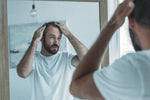
Does Creatine Cause Hair Loss? Understanding the Potential Side Effects
, by Sandesh Prasannakumar, 7 min reading time
New Year Sale Is Live - Shop Now!
New Year Sale Is Live - Shop Now!
New Year Sale Is Live - Shop Now!
New Year Sale Is Live - Shop Now!
New Year Sale Is Live - Shop Now!
New Year Sale Is Live - Shop Now!
New Year Sale Is Live - Shop Now!
New Year Sale Is Live - Shop Now!
New Year Sale Is Live - Shop Now!
New Year Sale Is Live - Shop Now!

, by Sandesh Prasannakumar, 7 min reading time
Creatine is among the most extensively studied and widely used sports supplements because of its performance-enhancing effect on high-intensity exercises. However, some people have concerns that taking creatine can lead to hair loss or thinning as a side effect.
However, something as natural as hair loss can be attributed to numerous factors, including genes, stress, and more, but some of the allegations have raised eyebrows about creatine’s health risks. In this article, the author will review the facts on whether the use of creatine would cause hair loss or thinning hair. We will also give you advice on how to take creatine if you are worried about hair loss or thinning side effects.
Several small-scale researchers have attempted to investigate whether hair loss is one of the side effects of creatine supplementation. Nonetheless, most of the studies reveal that there is not enough proof that creatine is responsible for hair loss and increased hair fall.
A 2021 systematic review and meta-analysis looked at hair loss as a side of creatine by evaluating the data obtained from 356 clinical trials. The creatine supplementation study showed no difference in hair loss between the users and nonusers.
A similar study by the same researchers on Rugby players who took creatine for 12 weeks did not find a change in hair loss as observed in the control group. The creatine group also had no detrimental effects that were linked to hair growth cycle changes.
From this, the majority of research will have it that even though creatine is known to raise DHT levels in some individuals, an androgen associated with male pattern balding, these increments are not high enough to bring about faster hair loss on their own.
In sum, it is still impossible to prove causality between the involvement of creatine and hair loss risks based on such clinical evidence. However, more studies are needed to arrive at conclusive statements regarding the matter. However, recent clinical studies indicate that creatine just aggravates the process of baldness for people with a genetic predisposition to MPB.
While creatine likely does not influence hair loss or thinning alone, some best practices can help you supplement safely:
Based on the currently available literature, smart supplementation practices show that creatine can be utilised safely without aggravating hair loss in the majority of consumers. However, pay attention to hair changes or to any other aspects which make you doubt the safety of this product and in this case, it is recommended to stop its usage.
Recent studies indicate that it is safe for individuals to take creatine supplements without experiencing further hair loss or hair thinning due to the supplement alone. Thus, although a residual risk likely persists among those genetically inclined to hair loss, correct dosing and cycling ought to effectively counteract any negative outcomes.
But as with any of the supplements, it is always wise to be careful and to pay attention to potential reactions that your body might be exhibiting. However, for those wanting to improve workout performance and supplement or increase recovery, creatine remains a good option and something that likely does not need to be avoided for hair’s sake where it is used appropriately and responsibly.
For the best quality creatine and other health supplements, visit Genetic Nutrition!
FAQs
1: Does creatine boost DHT to levels that result in hair loss?
These studies reveal that while creatine increases DHT levels slightly, the rise in DHT levels is not necessarily going to be high enough to cause hair loss on its own in most cases. Still, it is crucial to be careful with creatine supplementation, even for those who have a high genetic risk for cardiovascular disease.
2: Why do some people say that they lost all their hair after taking creatine?
Certain people may report excessive hair loss after taking creatine, but research studies evaluating these allegations demonstrate minimal direct links proving that creatine is the leading cause of hair loss. Shedding could be due to other reasons, and this could be a mere coincidence.
3: Does creatine lead to hair loss in women?
There is no evidence that Creatine has a direct effect on hair loss in women. Nonetheless, women who use creatine beyond the recommended limits are likely to experience heightened androgen activity. This male sex hormone stimulation could worsen conditions such as polycystic ovarian syndrome, resulting in thinning hair.
4: Is creatine safe for hair health regardless of my age?
Several studies on the effects of creatine have concluded that the supplement is safe and has no adverse effects on hair in most populations. There is no data available to indicate that creatine elevates the risk of balding or thinning in either the young or the elderly consumers so far. Nevertheless, more research is needed.